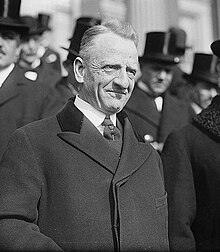Carter Glass
Carter Glass (born January 4, 1858 in Lynchburg , Virginia , † May 28, 1946 in Washington, DC ) was an American Democratic politician , President pro tempore of the United States Senate and Treasury Secretary .
Family and professional career as a newspaper editor
Carter Glass was the youngest of twelve children of the owner of the Lynchburg Daily Republican and postmaster of Lynchburg. His mother died in 1860, and his father then served as a major in the Confederate States Army during the War of Civilizations from 1861 to 1865 .
He himself received only a rudimentary school education and was already working as a printer in his father's newspaper at the age of thirteen. Nonetheless, he continued his education by reading the works of Plato , Edmund Burke and William Shakespeare . After not getting the job as a reporter in Petersburg he had hoped for , he returned to Lynchburg, where he worked in the office of a railway company.
In 1870 he finally got the job he had hoped for as a reporter for " Lynchburg News " and in 1887 rose to the position of editor . In 1888, with financial support from friends, he managed to buy the newspaper. In the following years he also bought his father's newspaper, the Daily Republican , and The Advance , so that he eventually became the only newspaper editor in Lynchburg.
Political career
Virginia State Senator and Congressman
In 1896 he began his political career as a delegate to the Democratic National Convention , where he heard a speech by the Democratic presidential candidate , William Jennings Bryan . In 1899 he became State Senator for Virginia and was a member of the Virginia Constituent Assembly from 1901 to 1902.
In a by-election in 1902, he was elected a member of the House of Representatives, where he represented the interests of the Democrats of the state of Virginia until 1918. In 1913 the House of Representatives elected him chairman of the influential banking and currency committee. In this role he played a key role in the Federal Reserve Act, which established the Federal Reserve System in 1913 .
Treasury Secretary under Wilson
On December 16, 1918, he was appointed Treasury Secretary by President Woodrow Wilson to succeed William Gibbs McAdoo . He held this office until February 1, 1920. He was succeeded by David F. Houston .
Senator and promotion to Senate President pro tempore
After his resignation as Treasury Secretary, he was elected Senator to succeed the late Thomas S. Martin as representative of Virginia . Together with the other Senator from Virginia, Harry F. Byrd , he was from 1933 a critic of President Franklin D. Roosevelt's New Deal policies . As a staunch advocate of conservative tax policy and the rights of the individual states, he turned down Roosevelt's offer to take over the Treasury. However, he became chairman of the powerful Senate Funding Committee in 1933 . As such, he was the namesake of the Glass-Steagall Acts, which became an important foundation in US banking legislation and established the Federal Deposit Insurance Corporation .
In addition, on July 11, 1941, he became pro tempore President of the United States Senate . He was the representative of the US Vice President , who is ex officio Senate President, as well as the highest ranking senator. He held this office until January 2, 1945.
Web links
- Carter Glass in the Biographical Directory of the United States Congress (English)
- Biography and portrait on the US Treasury Department homepage
- Carter Glass in the Miller Center of Public Affairs of the University of Virginia (English)
- Carter Glass takes to Oath . In: TIME magazine , January 18, 1943
- Elder Statesman . In: TIME Magazine , February 19, 1945
| personal data | |
|---|---|
| SURNAME | Glass, Carter |
| BRIEF DESCRIPTION | American politician, Treasury Secretary and Senate President Pro Tempore |
| DATE OF BIRTH | January 4, 1858 |
| PLACE OF BIRTH | Lynchburg , Virginia |
| DATE OF DEATH | May 28, 1946 |
| Place of death | Washington, DC |






